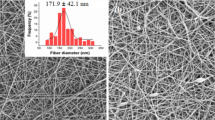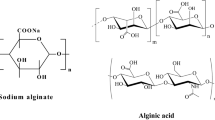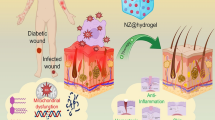Abstract
The deleterious effects of glycoxidation are dependent on the half-life of proteins. Collagen, the main component of extracellular matrices, is a long live protein and thus may be sensitive to the glycoxidation process. We incubated calf skin fibrous type I collagen in PBS at 37°C with glucose. The fibrous type I collagen was solubilized and an increase in the amount of advanced glycation end products of the solubilized fraction was observed. As there was no bacterial contamination and no proteolytic activities in the incubation medium, the solubilization of fibrous type I collagen is probably due to the speculative production of the free radicals in our experimental conditions. To test this hypothesis, fibrous type I collagen was incubated in PBS with AAPH (2,2′azo-bis 2-aminodinopropane) a free radicals generator. AAPH induced a dramatic and dose dependent solubilization of fibrous type I collagen.
Similar content being viewed by others
REFERENCES
Ahmed, M. U., Thorpe, S. R., and Baynes, J. W. (1986). J. Biol. Chem. 261: 4889-4894.
Bailey, A. J., Paul, R., and Knott, L. (1998). Mech. Ageing. Dev. 108: 1-56.
Brownlee, M. (1993). Clin. Invest. Med. 18: 275-281.
Davies, K. (1987). J. Biol. Chem. 262: 9895-9901.
Davies, K. J., and Delsignore, M. E. (1987). J. Biol. Chem. 262: 9908-9913.
Davies, K. J., Delsignore, M. E., and Lin, S. W. (1987). J. Biol. Chem. 262: 9902-9907.
Davies, K. J., Lin, S. W., and Pacifici, R. E. (1987). J. Biol. Chem. 262: 9914-9920.
Fu, M. X., Knecht, K. J., Thorpe, S. R., and Baynes, J. W. (1992). Diabetes 41: 42-47.
Glomb, M., and Monnier, V. (1995). J. Biol. Chem. 270: 10017-10026.
Hunt, J., Dean, T., and Wolff, P. (1988). Biochem. J. 256: 205-212.
Hunt, J., Bottoms, M., and Mitchinson, M. (1993). Biochem. J. 291: 529-535.
Laemmli, U. (1970). Nature 227: 680-685.
Lyons, T. J., and Jenkins, A. J. (1997). Diabetes Rev. 5: 365-391.
Miles, C. A., Sionkowska, A., Hulin, S. L., Sims, T. J., Avery, N. C., and Bailey, A. J. (2000). J. Biol. Chem. 275: 33014-33020.
Nagai, R., Ikeda, K., Higashi, T., Sano, H., Jinnouchi, Y., Araki, T., and Horiuchi, S. (1997). Biochem. Biophys. Res. Com. 234: 167-172.
Nagai, R., Ikeda, K., Kawasaki, Y., Sano, H., Yoshida, M., Araki, T., et al. (1998). Febs Lett. 425: 355-360.
Odetti, P., Aragano, I., Garibaldi, S., Valentini, S., Pronzato, M. A., and Rolandi, R. (1998). Gerontol. 44: 187-191.
Odetti, P., Pronzato, M. A., Noberasco, G., Cosso, L., Traverso, N., Cottalasso, D., et al. (1994). Lab. Invest. 70: 61-67.
Ortwerth, B. J., James, H., Simpson, G., and Linetsky, M. (1998). Biochem. Biophys. Res. Com. 245: 161-165.
Sady, C., Jiang, C. L., Chellan, P., Madhun, Z., Duve, Y., Glomb, M. A., et al. (2000). Biochim. Biophys. Acta. 1481: 255-264.
Sell, D. R., and Monnier, V. M. (1989). J. Biol. Chem. 264: 21597-21602.
Stegemann, H. (1958). Physiol. Chem. 311: 41-45.
Sullivan, R. (1996). Arch. Physiol. Biochem. 104: 797-806.
Takahashi, M., Hoshino, H., Kushida, K., and Inoue, T. (1995). Anal. Biochem. 232: 158-162.
Thorpe, S. R., and Baynes, J. W. (1996). Drugs Aging 9: 69-77.
Zu, J., Morita, J., Nishikawa, S., and Kashimura, N. (1996). Carbohydr. Lett. 1: 457-464.
Author information
Authors and Affiliations
Corresponding author
Rights and permissions
About this article
Cite this article
Meli, M., Granouillet, R., Reynaud, E. et al. In Vitro Glycoxidation of Insoluble Fibrous Type I Collagen: Solubilization and Advanced Glycation End Products. J Protein Chem 22, 527–531 (2003). https://doi.org/10.1023/B:JOPC.0000005502.48925.34
Published:
Issue Date:
DOI: https://doi.org/10.1023/B:JOPC.0000005502.48925.34




